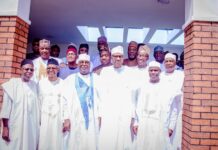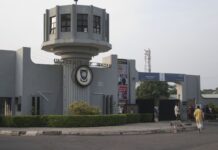Sonala Olumhense
On April 14, 2025, President Bola Tinubu “flagged off” the reconstruction of the Abuja-Kaduna-Zaria-Kano federal highway.
Tinubu, for the record, was away on vacation in France in an endeavour mischievously labelled a “working visit,” a contradiction in terms.
Under the new arrangement, the 700-kilometre road will cost N777bn and is meant to be completed within 14 months, according to the Minister of Works, David Umahi.
The problem is that Nigeria’s APC government has no track record of accountability or performance, even on large infrastructure projects that people can readily monitor. I cite the example of another segment of the same A2 highway, the Lokoja-Benin City road that it promised in March 2024 to complete within six months.
First, the AKR is NOT 700 kilometres (or 1500 as Umahi’s predecessor, Babatunde Fashola, once called it); this is a corrupt obfuscation.
The road is 375.9km long, and the APC government, as well as Julius Berger and the Nigerian Sovereign Investment Authority, through the PDIF, have always treated it as such.
Second, the AKR is NOT a new road, and it is curious that APC wants to present it as such. It is a road that is largely completed. In brief, here is its sad history under this government:
In December 2017, President Muhammadu Buhari awarded to Julius Berger a whopping N155.7bn contract for the job. Widely advertised by a presidential spokesman as one of Buhari’s “roads to glory,” its construction commenced in May 2018, and the project was to be completed in 36 months – by 2021.
Funding was to be with government appropriations starting in 2017, along with “additional provisions.” One of those provisions was the PDIF, and its audit reports show that:
In 2018, it “invested US$260 million” into five projects, which included the Lagos-Ibadan Expressway, the Second Niger Bridge (SNB) and the AKR;
In 2019 it “deployed N208.2 billion” into the Lagos-Ibadan Expressway, the SNB and the AKR; and in 2020, it “disbursed approximately N92.2 billion” into the three projects.
Further funds inflow into those projects arrived in the form of fresh Abacha loot repatriations in February 2020 when the United States and the Island of Jersey concluded an agreement to return US$311 million, to be invested exclusively in them.
Under a subsequent agreement in August 2022, the US repatriated another $23m.
“Combined with a $311.7m seized and repatriated with the assistance of the Bailiwick of Jersey and the government of Nigeria in 2020, this repatriation brings the total amount of funds repatriated in this case by the US to more than $334.7 million,” US ambassador Mary Leonard said.
She affirmed that the money would be used for the three projects so that it would be “transformed into a visible and impactful representation of the possibilities of government assets that directly improve the lives of average Nigerians.”
Despite all of the promises and funding, by the end of 2020 it was glaring that the AKR would not be completed in 2021 or during Buhari’s years.
The executive and the legislative arms squabbled over the design of the project, including Buhari giving Yolas Consultants a gift of N867m allegedly to redesign the road from four to six lanes, only to revert to two lanes.
“With barely 30% of the road project completed in more than two years, meeting up with the May 2021 deadline is highly unlikely,” the International Centre for Investigative Reporting said in December 2020, noting that the relevant Ministries had ignored its Freedom of Information requests.
And so, instead of delivering the project at the end of 36 months, in March 2021 Buhari ordered a two-year “complete reconstruction,” at a cost of N797.2bn!
It was a good, if belated decision, as the new project would feature footbridges, lighting, toll roads, service stations and rest stops. Mr. Minister Fashola affirmed that the project would be completed in the second quarter of 2023.
In April 2023, however, with time running out on the administration, Fashola was still singing that false song. Following an inspection, he declared that the road would be completed and commissioned before the Buhari administration expired. At the same event, Buhari’s Chief of Staff, Ibrahim Gambari, assured Nigerians that funding was “guaranteed.”
Project contractor Julius Berger sat through all the twists and turns as if it was an episode of ‘The Village Headmaster’ on television. While government officials went in circles about how the project would be completed in or before May 2023, at a Town Hall meeting in Kaduna in November 2020, Managing Director Lars Richer was emphatic that the completion date was 2025.
In January 2024, as the Tinubu government asserted itself in power, Mr. Umahi commended Julius Berger’s competence and performance, asserting that AKR would be completed by the end of that year.
He confirmed that 45 km of the 165km Abuja-Kaduna section had been completed, as was the entirety of Kaduna to Zaria.
“We have only 20 kilometres between Zaria and Kano, and then we have 40 or 38 kilometres from zero point,“ he said.
In September 2024, the government unilaterally imposed on Julius Berger a full downward review of the contract value to N740 billion, including a completion obligation of 14 months and the addition of solar lights.
Predictably, the contractor demurred, and in November, the government terminated the deal. It was quickly re-awarded to President Tinubu’s highly-connected friends at Hitech Construction Company, and then—as Daily Trust reported—to Infiouest International Limited (originally mistaken for Infoquest Nigeria).
What does this all mean?
First, that AKR is a potent example that while Nigeria’s ruling APC can serve power, it is incapable of serving people. Consider just how much time it has squandered on just 379km of one heavily-funded road, and you have the answer as to why Nigeria’s infrastructure is pathetic.
And now, to begin the next 10 years, the government introduces a contractor whose claim to fame is that it is “corporately active” and has leased equipment to Berger!
Remember: this is the same government that, among others, in July 2021, contracted Dangote Industries for N309bn to construct five roads. Remember: this is the same government that, in October 2021, gave over the construction of 21 roads to NNPC for N621bn. Have you seen those roads?
Whatever the problem may be with Julius Berger, it arrived on AKR with credibility and favourable credentials, including previous jobs nationwide, and the innovative and environmentally friendly cold recycling methodology about which even the Buhari government was enthusiastic.
Infiouest, whose spokesman so far is its employer, Umahi, has 14 months to demonstrate what it is capable of. But as I have argued in the past, the problem with Nigeria’s infrastructure development is the government, not contractors.
I therefore challenge Umahi not simply to make speeches and give contracts, but to establish a tracker on his Ministry’s website, with hyperlinks, so that Nigerians can track each contract, contractor and expenditure. And he should also account for all expenditure on AKR, as his most notable challenge, beginning from 2017.
My final invitation is to Nigerian civil and highway engineers. Towards providing an external check on government officials and contractors, I propose a national network of professionals to undertake and share occasional inspections of ongoing major highway projects.































































